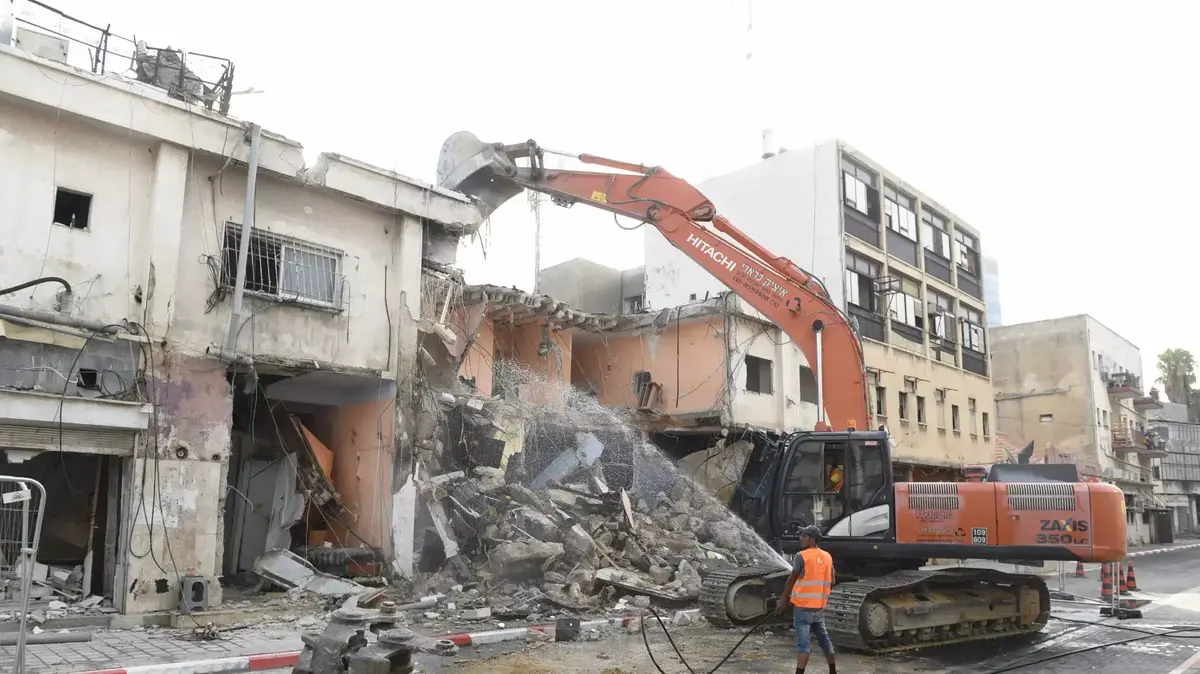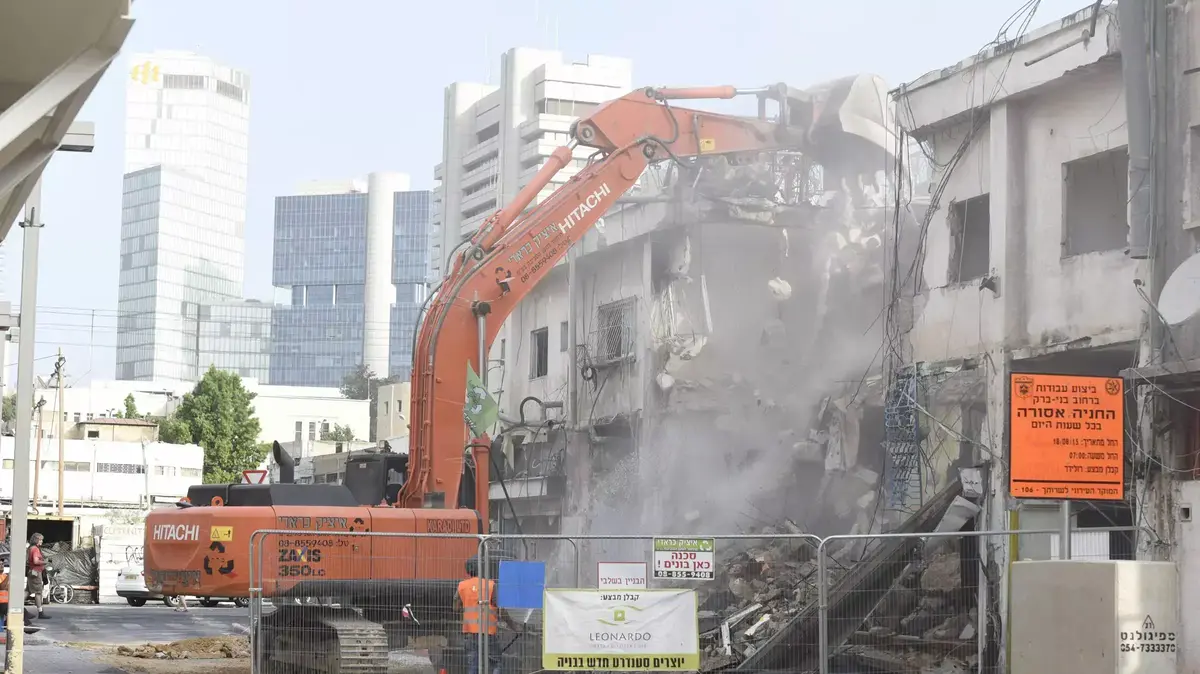Lowering the consent percentage, limiting extortionate construction offenders and a few more steps to remove barriers to urban renewal
The developer of the project, and even the state itself, will be allowed to file a lawsuit against reluctant tenants
Photo:
envato elements
Produced by the Department of Special Supplements
It is not new that many urban renewal projects are stuck, even though the issue has been defined by the Israeli government as a national goal, and even set out in the Strategic Housing Plan for 2017-2040, prepared by the National Economic Council and adopted by the Israeli government.
Everyone agrees that without large-scale urban renewal, the State of Israel will face planning difficulties.
The breakthrough occurred in April last year, when the Government Authority for Urban Renewal and the Ministry of Justice published a long and detailed document, which concerned the removal of barriers to urban renewal.
The main points of the document were submitted to the Knesset for approval these days as part of a bill, but the legislation was stopped due to the absence of a government.
Want to stay up to date all the time?
Sign up now for the Real Estate Newsletter today
Talking real estate with Ofer Petersburg. Listen to the new podcast >>
The document summarizes a long staff work, carried out by the Government Authority for Urban Renewal with the involvement of many factors, including the Ministry of Justice, Ministry of Finance, Ministry of Welfare, Planning Administration, RMI and more. The document presents a (not short) list of barriers .
"First of all, it is important to congratulate the good work done by the Government Renewal Authority and the Ministry of Justice and on the conclusions and solutions presented in the document," said Advocate Dan Halpert, Deputy Chairman of the Bar Association's National Renewal Committee TMA 38 projects and evacuation-construction complexes throughout the country.
With the help of Adv. Halpert, we present 10 barriers and solutions for their removal, as raised in the document of the Government Authority for Urban Renewal and the Ministry of Justice.
1. 100% consent
Recruitment of the required majority of apartment owners to submit a demolition and construction plan that is not an evacuation-construction plan:
In general, in order to submit a master plan (city building plan), the consent of all apartment owners in the buildings in the complex in respect of which the master plan is being promoted is required.
In order to facilitate the promotion of master plans for demolition and reconstruction in complexes declared as evacuation and construction complexes, the legislature stipulated that this could be done by a reduced majority of 50% of apartment owners in each building in the complex (and 60% of apartment owners throughout the complex).
However, there are buildings in which the TMA 38 project (demolition and construction) cannot be carried out, nor an evacuation-construction project (because they do not meet the conditions for declaration as an evacuation-construction complex). With such buildings, the consent of 100% of the apartment owners is required to advance the plan. Demolition and construction The result is that in such cases the opposition of one apartment owner in the building is sufficient to prevent the entire project.
In this regard, the Government Authority for Urban Renewal and the Ministry of Justice recommend amending the law so that a demolition and construction plan can be submitted by a reduced majority even in cases where the complex does not meet the definition of an evacuation-construction complex.
The drafters of the document explained their recommendation as follows: "Our goal is to promote urban renewal in a variety of ways, not necessarily by way of evacuation and construction, and to facilitate the submission of such a plan. In light of this, it is proposed to amend the regulations so that a certain majority of apartment owners. As stated, and there is no need for the consent of 100% of them, which is a real obstacle. "
Anyone involved in the field of urban renewal knows that there is a huge difficulty in obtaining the full consent of all apartment owners (especially when it comes to a large number of apartment owners in a building).
"The recommendation of the drafters of the document is very important," emphasizes Adv. Halpert, "100% consent is really unrealistic, and in any case no developer will agree to invest time and resources in advancing a plan, which requires the consent of all apartment owners."
2. The required majority
Recruitment of the required majority of apartment owners to carry out an evacuation-construction project:
According to the provisions of the law in its existing wording, the execution of an evacuation-construction project is conditional on the signing of 80% without the apartments in the complex on an agreement with a developer.
It is not disputed that the majority set by law is too high and allows apartment owners who are not interested in carrying out the project or those who are interested in it on the condition that they receive excess consideration (extortionists) to thwart the project.
The Government Authority for Urban Renewal and the Ministry of Justice believe that "the requirement for most of the apartment owners for the purpose of filing a lawsuit against the refusing apartment owners is overly stringent and inconsistent with government policy."
Therefore, the drafters of the document propose to reduce the required majority so that it stands at only 66%, in order to facilitate the filing of a lawsuit against apartment owners who oppose the project for unreasonable reasons.
3. Without common property
Calculation of the majority required for the approval of an urban renewal project
:
The majority needed to promote the TMA 38 project is 80% of the apartment owners, to whose apartments 80% of the common property is attached (a similar arrangement, with different numbers, also exists in evacuation-construction projects).
The Government Authority for Urban Renewal and the Ministry of Justice believe that it is appropriate that in calculating the required majority, the requirement to calculate the common area attached to the apartments be deleted.
That is, the calculation will be made on the basis of the number of apartments and regardless of the share in the common property.
"This is a correct amendment," explains Adv. Halpert, "because according to the arrangement, it is not enough today to have a majority of the number of apartments supporting the project, but it is necessary that those apartments also hold a very large part of the common property, and this is not really necessary."
4. Who can sue?
Filing a claim against a refusing tenant
:
Today, only the other apartment owners in a building or complex may file a lawsuit against a refusing tenant, and this sometimes raises difficulties.
The drafters of the document believe that the law should be amended so that the developer of the project will also be able to file the lawsuit against the refusing tenant, and even the state itself will be allowed to file a lawsuit in cases where it promotes the project and there is a significant public interest in urban renewal.
5. Construction offenses
Apartment owners in an urban renewal complex who have committed construction offenses
:
In many complexes of urban renewal, phenomena of construction offenses committed in existing buildings are revealed.
For example, split apartments, building additions built without a permit, apartment owners who invaded yards or roofs or other common areas.
The perpetrators of the construction offenses sometimes condition their consent to the project in that the developer will give them unreasonable consideration, which is an addition to the existing area and situation, even though it was not built legally.
The Government Authority for Urban Renewal and the Ministry of Justice are proposing to amend the law so that it determines that an apartment owner who refuses a transaction and who has committed a construction offense in the apartment, will not be counted in the number of apartment owners in the same building.
Moreover, the drafters of the document suggest that as part of the calculation of the compensation, the person who built it illegally will be considered as refusing an unreasonable refusal of the transaction, and he will receive his share of the compensation regardless of the construction offense he committed.
The proposed amendment is very essential to deal with apartment owners who condition their joining the project in receiving an excess consideration, which treats the illegal construction as if it were legal.
6. State-owned apartments
In many evacuation-construction complexes there are apartments owned or managed by the state or the local authority.
Promoting the project in front of housing companies, which act on behalf of the state, in front of local authorities, in front of the Custodian General, etc., takes a long time and involves cumbersome bureaucracy.
In this regard, staff meetings were held with the participation of representatives of the Custodian General and the public housing companies, and an outline for more effective cooperation in dealing with urban renewal transactions was agreed upon.
A uniform appendix to the amendments to the agreements with the housing companies has been prepared, in order to avoid delays.
7. Appointment of an appraiser
Appointment of an appraiser to examine the economic viability of the developer's proposal to tenants:
According to the permanent arrangement in the Evacuation and Construction Law, a majority of 66% of the apartment owners in the complex may contact the director of the Government Authority for Urban Renewal and request the appointment of an evacuation-construction appraiser, who will determine whether the deal offered to them is economically worthwhile.
The existing arrangement allows for the examination of the economics of the project for the apartment owners at a relatively late stage, and after many of the apartment owners have already contracted with the developer in the transaction, then the examination of the economics becomes irrelevant.
It is proposed to change the law and stipulate that it will be possible to appoint an appraiser by a majority of only 30% of the apartment owners.
Such an amendment will allow the appointment of an appraiser at an earlier stage.
The apartment owners will be able to examine at the initial stage of the contacts with the developer the offer submitted to them and make an informed decision.
Adv. Halpert explains that the main difficulty in this matter lies precisely in the practical level of financing the same appraiser's opinion. If the apartment owners are unable to finance the appraiser's salary, it is very important to find a budget source to help the apartment owners consult with an appraiser at the beginning of the project. Agreement with the developer.
8. Anchoring the collateral
Providing guarantees that will protect the apartment owners in the event that the developer goes bankrupt:
The Government Authority for Urban Renewal and the Ministry of Justice recommend "determining in cogent legislation the collateral to be provided in an eviction and construction transaction to the owners of the value apartments, at the full value of the value of the apartment including VAT, and a security to guarantee the rent paid during construction."
The guarantees are extremely important, to protect the apartment owners from the collapse of the developer.
Precisely this issue has erupted and has not been regulated in legislation to date.
"It is to be regretted," continues Advocate Halpert, "that such an acute issue does not find a place around the legislature's table.
It was right to stipulate in clear legislation what guarantees each developer must provide to apartment owners in urban renewal projects.
The issue is open and dangerous and it is worthwhile to act on its anchoring in the framework of legislation ahead of time and before an unfortunate event occurs, in which apartment owners will find themselves in a legal situation, to the point of losing a large part of their property value.
"Legislation should stipulate all the guarantees required for this type of transaction, including a sales law guarantee for the value of the new apartment, a rent guarantee, a tax guarantee, a inspection guarantee (for construction defects in the new apartments), a registration guarantee (to correct the taboo at the end of the project) and an improvement levy guarantee."
Lawyer Ravit Sinai, who represents tenants in urban renewal, adds: "In the agreements I draw up, I include conditions for the banking support that completely cover the tenants until appropriate legislation is amended.
If we look at the realization of the sale law guarantee - the tenants have to bring a declaratory loss to the developer's situation and it costs the tenants money they are supposed to pay out of pocket.
"A declaratory claim to the district costs at least one hundred thousand shekels." Therefore, I demand a guarantee for legal expenses from the developer for the realization of a sales law guarantee. "
9. Conflicts of interest
Prevention of a conflict of interest between the lawyer representing the apartment owners and the developer
:
The drafters of the document propose to establish (together with the Bar Association) rules for the prevention of conflicts of interest of the lawyer.
Among other things, it will be determined that the lawyer representing the apartment owners will be chosen by the apartment owners and not by the developer. Fees will not be paid directly by the developer but will be paid to a trust account and from there to the lawyer, until the project is completed the lawyer will not be able to provide legal services. Not in another project.
This section, according to attorney Ravit Sinai, highlights the problematic nature of tenants applying for representation in an office that also represents entrepreneurs. It is important for me to contact an office that represents tenants.
'The biggest problem with evacuation construction is the fact that every tenant has an interest in bringing in a developer he knows.
The solution is the tender method that allows each developer to participate in the tender subject to the conditions set with the tenants in advance. "
10. Offensive stamping
Exercising
unreasonable pressure from developers on apartment owners:
The drafters of the document were presented with the phenomenon of exploiting weak apartment owners and operating improper practices on the part of developers, including exerting pressure on apartment owners to sign an agreement without them being represented and sometimes without being aware of the details of the transaction.
In this matter, the Government Authority for Urban Renewal and the Ministry of Justice propose to create a unique tort tort, and even to examine whether it is appropriate to establish a mechanism for compensation without proof of damage.
The drafters of the document recommend setting certain cases that will be considered offensive signing, for example when a developer provides apartment owners with false information about the number who agree to the transaction up to that point, or when an entrepreneur signs a document that does not contain basic details, such as the developer's identity. , Or when unreasonable pressure is exerted on the landlord to sign the agreement.
Produced by the Department of Special Supplements















